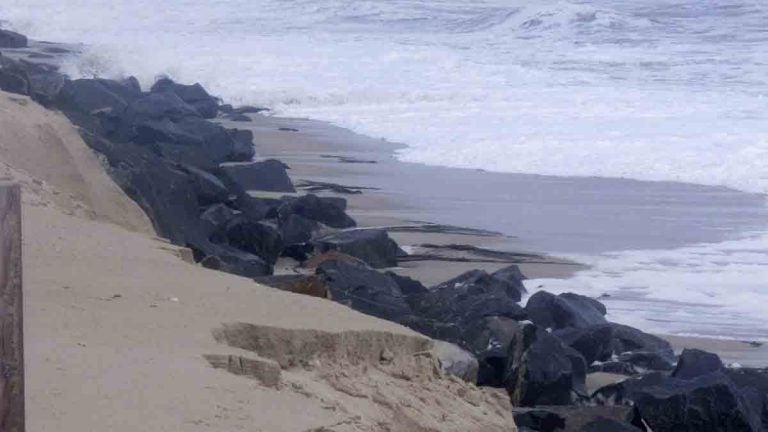Oceanfront owners ask judge to block Jersey Shore dunes

This Oct. 5
A group of oceanfront homeowners in Bay Head, New Jersey is saying thanks, but no thanks, to the government and its money.
The residents on Monday asked a state judge to exempt them from a protective sand dune project, arguing that the millions they’ve spent from their own pockets on a rock wall — and the millions more they will spend on its upkeep — will do the job better than what the government proposes.
The homeowners have been pushing back for nearly three years against Republican Gov. Chris Christie’s plan to erect protective sand dunes along most of New Jersey’s 127-mile coast. Among them is Lawrence Bathgate II, who was the national Republican finance chairman under Presidents Ronald Reagan and George H.W. Bush, and raised money for both of George W. Bush’s presidential campaigns and Jeb Bush’s 2016 primary campaign.
More than a dozen residents from Bay Head and neighboring areas asked Superior Court Judge Marlene Lynch Ford to block the state from seizing strips of their land for the project. She is the same judge who last year upheld the state’s right to seize land from resistant homeowners for the dune project, but agreed to consider what might be special circumstances in Bay Head, where parts of the shoreline have been protected by a man-made rock wall since the 1800s.
The homeowners have spent $5 million on the wall between their homes and the ocean, and say the government’s proposed project is wasteful and unneeded in their area. Their homes lie in an area that was devastated by Superstorm Sandy in 2012.
“This is a system that has not cost the government a penny, and it is a system that has worked,” said Anthony Della Pelle, an attorney for the homeowners. “The only people who it would protect are the people in this courtroom today — and they don’t want it. That is the biggest irony of all.”
The residents want to be excluded from the $128 million, 14-mile project, nearly two miles of which would be built by the U.S. Army Corps of Engineers in front of the existing rock wall.
Stephen Eisdorfer, an attorney for the state Department of Environmental Protection, said the dunes need to be “continuous, uniform and gapless” in order to work properly. The state has an interest not only in protecting lives and property, but in maintaining wide beaches for public use that “are part of what makes New Jersey New Jersey.”
Robert Hein, a Bay Head borough councilman, lives across from the beach in an area where there was no rock wall when Sandy hit on Oct. 29, 2012. His house sustained damage, including 2 feet of flooding that required a massive cleanup effort. When neighbors got together after the storm and solicited donations toward the cost of extending the rock wall, Hein eagerly chipped in, saying he “learned a valuable lesson.”
Thacher Brown, a leader of the dune resisters’ group, said his house came through Sandy unscathed thanks to a robust dune. But that dune lost two-thirds of its sand, convincing him of the need to extend and heighten the rock wall. He and other oceanfront owners pay between $1,000 and $1,500 two to three times a year to hire bulldozers to push sand back up onto the rock barrier.
They also fear that if the government seizes control, they won’t be able to maintain their dunes or keep the rocks covered with sand, expressing deep skepticism of Congress’ willingness to pay for replenishment every four years for the 50-year life of the project.
“We had a storm two weeks ago, and we’re prepared to do a sand push; we don’t have to wait for government authorization or funding,” Brown said. “Once the government is in control, I have no faith they will maintain the beach and dunes the way we have.”
The trial is expected to take most of this week.
WHYY is your source for fact-based, in-depth journalism and information. As a nonprofit organization, we rely on financial support from readers like you. Please give today.




